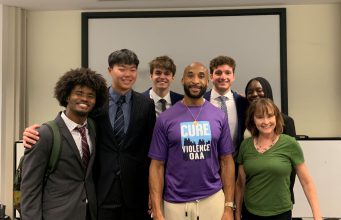
For well-educated graduates who earned their degrees in a recession, rough beginnings often make for a better ending or at least greater satisfaction. This conclusion comes from findings in a recently published paper by Emily Bianchi, assistant professor of organization and management at Emory University’s Goizueta Business School. The paper, The Bright Side of Bad Times: The Affective Advantages of Entering the Workforce in a Recession, published in the most recent issue of Administrative Science Quarterly explores whether well-educated graduates who earned their degrees during economic downturns were ultimately more satisfied with their jobs, even though these jobs were often less prestigious and well-paid.
The paper analyzed data from two large government-run surveys that have been administered regularly since the 1970s. The results showed that people who earned their degrees during economic downturns were more satisfied with their current jobs than those who first looked for work during more prosperous economic times. These results could not be accounted for by generational differences or differences in industry or occupational selection. These findings are particularly surprising given the well-documented negative financial aspects of graduating in a recession. Recession graduates earn less money and often hold less prestigious jobs. However, Bianchi argues that how people evaluate what they have does not always reflect the value of what they have. As she writes, “Decades of psychological research has shown that how people feel about their outcomes does not always mirror the objective value of these outcomes.” People can be happy with less, depending on how they think about their outcomes.
Bianchi finds that people who graduate in economic booms are more likely to wonder if they could have done better and ruminate over paths not taken. Recession graduates, however, are more likely to feel grateful to have a job at all and spend less time wondering how they might have done better. Moreover, this way of thinking about work tends to endure. Recession graduates were typically more pleased with their jobs both early in their careers and even decades later. The earlier trials of their career seemed to positively influence their evaluations of later jobs. Bianchi argues that this conclusion is consistent with recent research in psychology that reveals that some adversity is associated with greater happiness than either too much or too little. “Too much adversity can be emotionally debilitating. Too little can weaken resilience, allowing people to magnify and exaggerate the bumps of everyday life,” explains Bianchi.
About Emily Bianchi
Emily Bianchi joined the Goizueta Business School in 2011. She holds a PhD in Management from Columbia University and a BA in Psychology from Harvard University. Bianchi’s research investigates how entering adulthood in a recession influences later attitudes and behaviors as well as how current economic conditions affect interpersonal interactions, social support, and cooperation. Prior to graduate school, Bianchi was a Senior Consultant for Booz Allen Hamilton.
About Emory University’s Goizueta Business School
Emory University’s Goizueta Business School is home to an Undergraduate degree program, a Two-Year Full-Time MBA, a One-Year MBA, an Evening MBA, an Executive MBA (Weekend and Modular formats), a Doctoral degree and a portfolio of non-degree Emory Executive Education courses.










